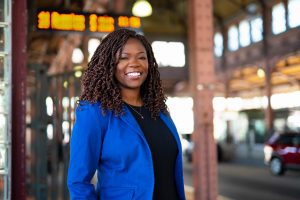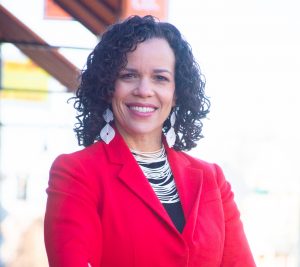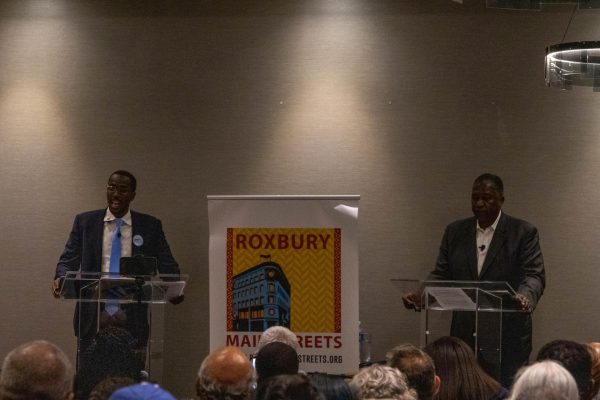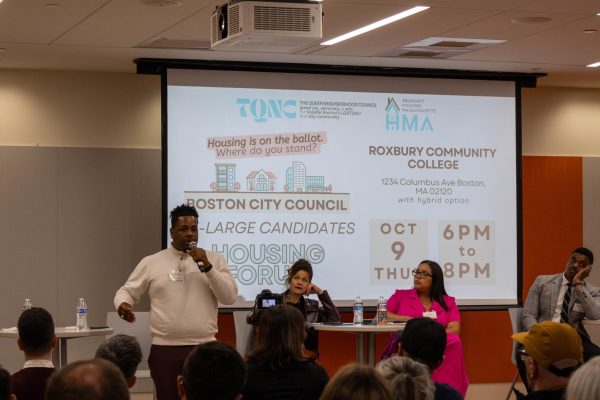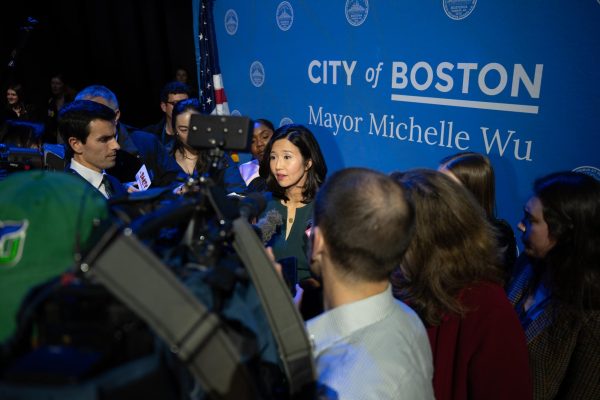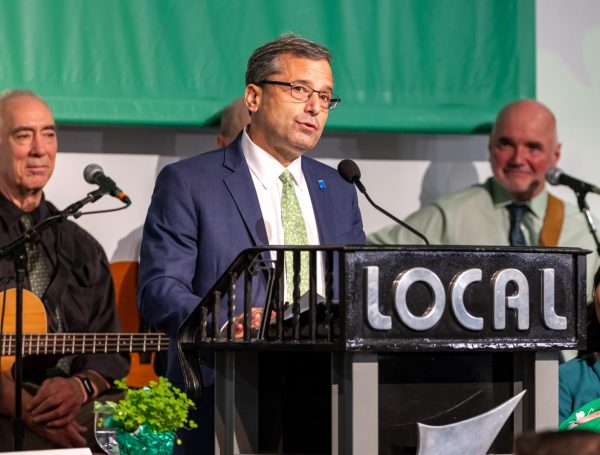City council race: Mary Tamer running for District 6
Mary Tamer, a former Boston School Committee member and past president of the League of Women Voters of Boston, is running to represent District 6 in the city council. The incumbent, Councilor Matt O’Malley, said he will not seek re-election this year. Tamer is running against Kendra Hicks and Kelly Ransom for the District 6 seat.
Born and raised in West Roxbury, Tamer attended Boston Public Schools and later served for four years on the Boston School Committee, working on equity and inclusion for students. As president of the League of Women Voters of Boston, Tamer helped register eligible high school students and naturalized citizens to vote.
Tamer said she wants to focus on working collaboratively with others if elected councilor. “We have seen so much division in these last few years at so many levels of government. And one of the things that I really want to do is find new and innovative ways to bring people together to bring our community together.”
Key issues in her campaign, Tamer said, include ensuring equitable recovery from COVID, with a focus on the neighborhoods and citizens who have been most impacted, providing access to a high quality education for every child, and preparing Boston to be a national leader on combating climate change and carbon reduction.
“We are so fortunate in District 6 that we have the largest tree canopy in the entire city of Boston,” she said. “But I, and so many of the people that I’m talking to as part of my campaign, are very focused on making sure that other neighborhoods also have incredible tree canopies because it does so much in terms of mitigating the gas leaks that we know we have throughout the city, providing clean air and shade which is essential.”
Tamer lives with her husband and their two sons in West Roxbury.
The Scope spoke with Tamer to discuss her campaign’s top issues and her plans to address them if elected. The following conversation has been edited for length and clarity.
What are the most important policy issues on your platform?
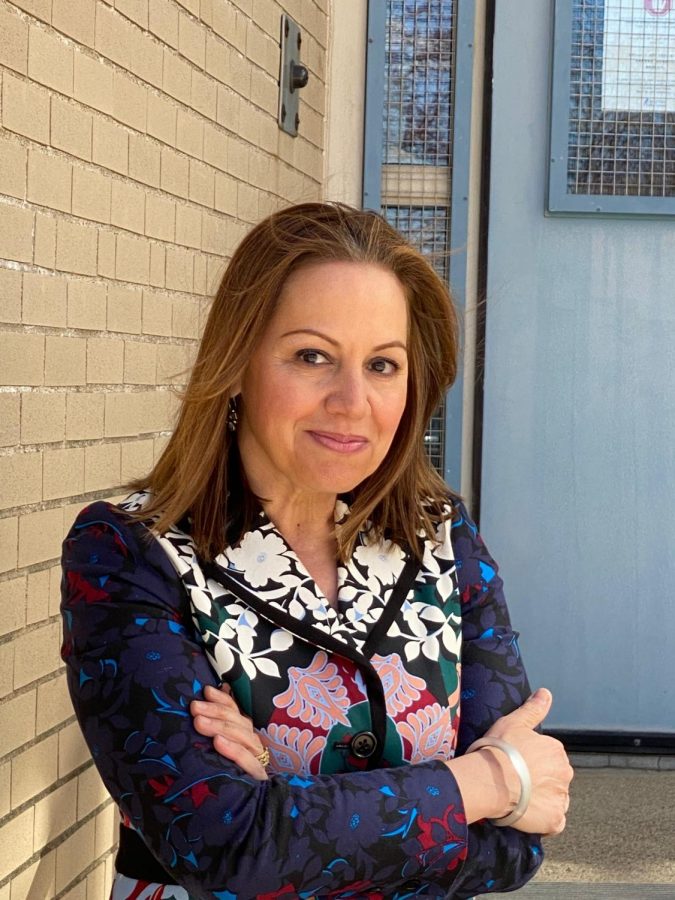
I think number one, we’re working toward an equitable recovery from COVID, with a focus on the neighborhoods and citizens who have been most impacted. Also ensuring that every child in the city of Boston has access to a high quality education and the Boston Public Schools that prepares them for a pathway to success. And I’m working to put strategies in place to make Boston a national leader on combating climate change and carbon reduction. There are a lot more but I think those are some of the really critical parts of my campaign.
How do you plan to achieve these goals?
For COVID recovery, I think it’s about pushing the city to ensure that testing and vaccines are happening in an equitable manner, and I was thrilled to see that the Whittier street Health Center is utilizing a mobile vaccination site to take vaccines to those who are in the most need. I think we need to dramatically increase mobile vaccinations to make this as easy as possible for our most vulnerable residents and populations.
We need to make sure we are giving small businesses what they need to recover from this. This has been an incredibly difficult time for our small business community. We are also fortunate here in Boston to have unique neighborhoods with a wonderful collection of small and often family-run businesses, and we need to work and support them in any way we can, whether as a community, but also as a city.
We also need to work with parents and teachers to get our kids back to school in the safest possible manner, and we need to ensure that every school has a plan in place to address the learning loss, the emotional impact of these last 12 months that we’ve all lived through, and also a re-socialization of children. I truly believe that — for so many of our students who have been learning from home for the last year … in their bedrooms, on their laptops, isolated from their friends, their teachers, their school communities — the return to school would be difficult for [them].
I just want to be sure that we’re doing everything we can, and providing the support structure that frankly our students and our teachers need in order to have a successful return and re-entry.
I do know they’re planning to for the last couple of weeks of April, and a couple weeks of the semester, open up middle schools. When I saw that the other day, I’m like, ‘You guys could not put an emergency plan in place to keep it until the fall where students are able to get vaccinated. It does not seem like the right time.’
We are in such a challenging situation and have been for these last 12 months, and I have talked to so many families who, their children are doing well at home and it has been an OK experience for them. But then I’ve talked to other families, including so many families of students with disabilities. I talked to one mom whose son was verbal, and then as a result of being out of school and being away from the services that have been successful for him, he lost his verbal skills. I’ve talked to parents who have seen regression in their children whether it’s behavioral regression, academic regression. Parents have spoken to me about some of the mental health struggles, anxiety based struggles their children have faced as the rituals and routines that everyone has become used to have changed so dramatically, and I think for some students, [returning] to school is really important, but … I believe that the vaccination of our teachers should have been a top priority.
Going back to my desire to see an expansion of mobile vaccination sites, I would love to see mobile vaccination sites going to all of our schools, all of our senior facilities and living centers. We need to vaccinate as many people as we can and I do believe we need to bring it to them. I think we need to make this an easy seamless process for the safety of all, and I do hope that the vaccinations for children will be prioritized to alleviate the fears that folks have about going to school. But I also believe that schools and districts are doing the right things by making this optional there are some children and families who do not feel safe sending their children back to school and I completely respect the decisions that families make for their children.
But I also want to respect those families who do believe it’s right for their children to go back to school following the CDC guidance. We need to follow the guidance that has been given and provide that opportunity to return for the families who feel that that is what is best for their children.
In terms of what I would do to implement certain policies when it comes to some of the environmental work that is truly within the realm of possibility for us, we have an opportunity to set a very firm timeline on when we want to say that all of the city’s fleet of cars and trucks, and all of the vehicles are electric. I think we should do the same for our school buses and for our MBTA buses. We really need to set some deadlines on what we are going to do to reduce our carbon emissions in the city.
I also think we have the opportunity to make recycling mandatory. I would also love to see composting not only become mandatory but also to have curbside composting as an opportunity to make it easier for folks to participate in what is a really important program to deal with food waste. When you think that 78% of our trash is coming from businesses and our institutions in the city, we have to look at what we can do to increase our level of recycling and composting and all of those facilities. I also believe that our BERDO [Building Energy Reporting and Disclosure Ordinance], a program in the city of Boston where every building has to undergo an energy audit every five years, and then they are supposed to come up with a plan of how they’re going to address their emissions and what they are contributing in terms of environmental impact.
I think maybe it should be less than five years. We know already that it’s only 3% of the buildings in Boston that contribute to at least 50% of the carbon emissions. So we really need to have some robust discussions around what can we do to change those numbers, to change that data set for better outcomes. And lastly, we are so fortunate in District 6 that we have the largest tree canopy in the entire city of Boston. But I, and so many of the people that I’m talking to as part of my campaign, are very focused on making sure that other neighborhoods also have incredible tree canopies because it does so much in terms of mitigating the gas leaks that we know we have throughout the city, providing clean air and shade which is essential. So I think that’s also something that I would really want to prioritize.
How is your campaign different from other candidates running for the same District?
I think it’s exciting that we have three accomplished women running for this seat and we all bring different life and professional experiences to this role. My experience includes four years as the only parent member serving on the Boston School Committee, or I should clarify, I was the only member who had children who were enrolled in the Boston Public Schools for my entire four years as a school committee member. I’m also a graduate of the Boston Public Schools and I’ve been volunteering for the Boston Public Schools since I graduated from college. So more than 30 years of involvement, and this is work that has been deeply important to me.
As someone who has created policy with a lens on equity and inclusion for all of our students, including some of our most vulnerable students in the District, that work would serve me well as a policymaker on the city council. I know how to get things done and I have a track record of getting things done also as a result of my long time involvement on the board of the League of Women Voters of Boston and as a past president of the League of Women Voters of Boston.
Some of my most memorable and favorite events were going into high schools and registering students to vote for the first time, being present at naturalization ceremonies that took place at Faneuil Hall and literally our new citizens would come streaming out of a Faneuil Hall with American flags in their hands and we would rush over to them with voter registration forms to congratulate them on being citizens and also to say, now you can register to vote and you can vote in the next election. That work was so important to me.
I also believe that I am someone who wants to work collaboratively with others. We have seen so much division in these last few years at so many levels of government. And one of the things that I really want to do is find new and innovative ways to bring people together to bring our community together. And so that is something I really would like to focus on.
What do you like about District 6 and what can be changed?
There are so many things I appreciate about District 6. But I think at the top of the list is the strong sense of community that exists here. We have so many caring and committed people who contribute to the District in myriad ways. We have a level of volunteerism that I find so inspiring, and whether folks are part of committees or organizations focused on our green spaces, climate change, affordable housing or neighborhood zoning, the majority of people are truly involved and committed to the neighborhoods in District Six, but also to the city as a whole.
Our green spaces are, without question, such a privilege for all of us who live here, as is our tree canopy, which is the largest in the city, but I appreciate how many people I’ve spoken with who have mentioned the importance of increasing the tree canopy in other neighborhoods as well, which I completely agree with.
As for [what can be] changed, as a city councilor, I want to push for greater levels of planning and predictability, whether it pertains to development across our neighborhoods, or our school system. I also want to pick up the environmental work that Councilor O’Malley has led for the city council so that District Six can continue to lead on environmental and climate issues.
Also equally as important, we need to address the disparities and inequalities that exist across our city, at every at every possible level, and that is the work that I truly look forward to joining with other city councillors on because that could possibly be some of the most important work that we do in these next several years.



